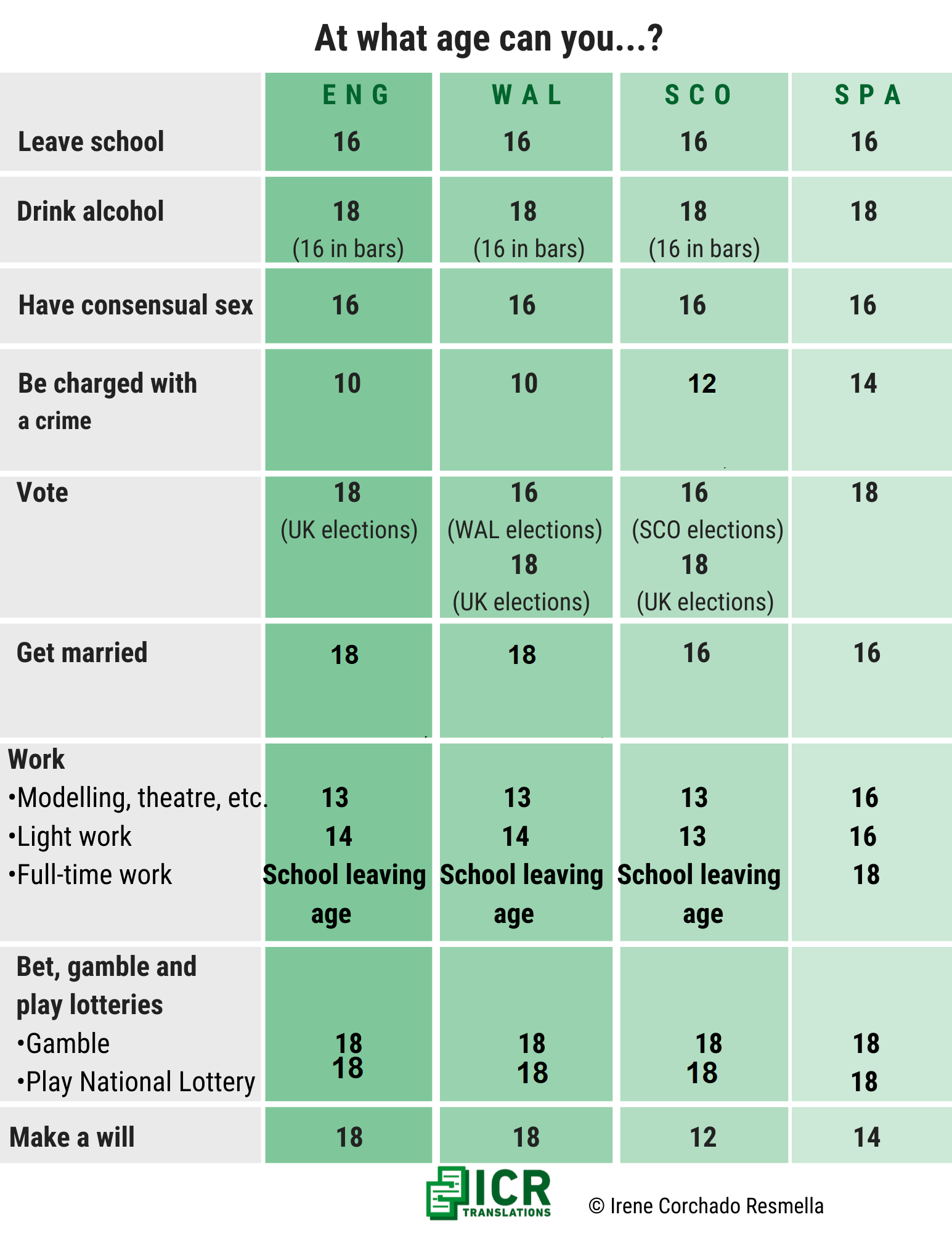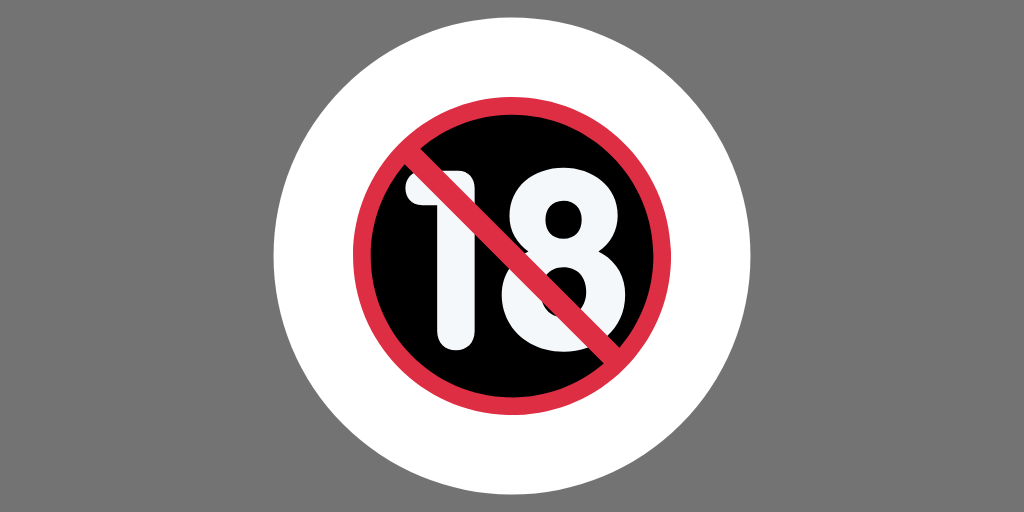Last updated on 24/06/24
What is the youngest age to work in England? At what age can you get married in Scotland? Can Spanish under-18s play lotteries?
Today’s article would suit a legal trivia night well. Learn what the minimum legal age to do certain things in England, Wales, Scotland, and Spain is. Compare the facts, check legal sources, and use the table at the end as a reference.
At what age can you…?
Contents
Leave school
England
People turning 16 by the end of the summer holidays can leave school on the last Friday in June. However, they are required to stay in education, start an apprenticeship or traineeship, or work and study (or train) part-time, until they turn 18.
Wales
People turning 16 by the end of the summer holidays can leave school on the last Friday in June.
Scotland
People can leave school after the 31 May of the year in which they turn 16, provided that they turn 16 between 1 March and 30 September.
If they turn 16 between 1 October and the end of February, they can leave school at the start of the Christmas holidays in that school year.
Source for the information regarding England, Wales and Scotland
Spain
Artículo 4.1 Ley Orgánica 2/2006, de 3 de mayo, de Educación states that the so called educación básica – comprising Primary Education and Compulsory Secondary Education – is compulsory and free for everyone. Section 4.2 then provides that the educación básica comprises a period of ten years in education between the ages of 6 and 16. Students are allowed to take extra time to complete the educación básica until the year in which they turn 18.
Drink alcohol
England and Wales
Under-18s cannot buy (Licensing Act 2003, s 149(1)) or consume (Licensing Act 2003, s 150(1)) alcohol, but people aged 16 or 17 can drink wine, cider or beer with a meal in restaurants, if accompanied by an adult (Licensing Act 2003, s 150(4)).
Scotland
Under-18s cannot buy (Air Weapons and Licensing (Scotland) Act 2015, s 105(1)) or consume (Air Weapons and Licensing (Scotland) Act 2015, s 106(1)) alcohol, but people aged 16 or 17 can drink wine, cider or beer with a meal in restaurants, if accompanied by an adult (Air Weapons and Licensing (Scotland) Act 2015, s 106(3)).
Spain
While there is no national law on alcohol consumption, all 17 Spanish autonomous communities have set 18 as the minimum legal age to drink and buy alcohol.
Have consensual sex
England and Wales
The age of consent to sexual activity in England and Wales is 16.
Under section 9(1) of the Sexual Offences Act 2003, it is illegal to engage in sexual activity with an under-16.
Scotland
The age of consent to sexual activity in Scotland is 16.
Under section 28 of the Sexual Offences (Scotland) Act 2009, it is illegal to have intercourse with an older child (defined as a person who has attained the age of 13 years, but not the age of 16 years).
Under section 21 of the Sexual Offences (Scotland) Act 2009, it is illegal to participate in a sexual activity with a young child (defined as a person under the age of 13).
Spain
The age of consent to sexual activity in Spain is 16, as artículo 183.1. Código Civil makes it a crime to engage in sexual activity with someone under that age.
Did you know? Until 2015, the minimum legal age for having consensual sex in Spain (13) was one of the lowest in Europe.
Be charged with a crime
England and Wales
The minimum legal age of criminal responsibility in England and Wales is 10, as established by section 50 of the Children and Young Persons Act 1933.
Scotland
The minimum legal age of criminal responsibility in Scotland is 12, after the Age of Criminal Responsibility (Scotland) Act 2019 came into force on 17 December 2021. Before that, Scotland had Europe’s lowest minimum age of criminal responsibility – eight years.
Spain
The minimum legal age of criminal responsibility in Spain is 14.
Criminal responsibility for people aged between 14 and 18 is governed by Ley Orgánica 5/2000, de 12 de enero, reguladora de la responsabilidad penal de menores, while criminal responsibility for people aged 18 or over is governed by Ley Orgánica 10/1995, de 23 de noviembre, del Código Penal.
Vote
UK general elections
To vote in a UK general election you must be 18 or over, and meet two other criteria:
- be a British citizen, a qualifying Commonwealth citizen or a citizen of the Republic of Ireland; and
- not be subject to any legal incapacity to vote.
National Assembly for Wales elections
Section 10 of the Senedd and Elections (Wales) Act 2020 recently extended the right to vote in Senedd elections to people aged 16 and 17. Three other criteria must be met:
- be a British citizen, a qualifying Commonwealth citizen, or a citizen of the European Union;
- be a resident in Wales; and
- not be subject to any legal incapacity to vote.
Scottish Parliament elections
To vote in a Scottish Parliament election you must be 16 or over, and meet two other criteria:
- be a UK, Commonwealth or EU citizen residing in Scotland; and
- be on the electoral register.
Spanish general elections
The Spanish electoral law currently in force, Ley Orgánica 5/1985, de 19 de junio, del Régimen Electoral General, provides that Spanish citizens of full legal age (18, as established on the Spanish Constitution) can vote in general elections.
Get married
England and Wales
The minimum age to get married in England and Wales is 18, after The Marriage and Civil Partnership (Minimum Age) Act 2022 came into force on 27 February 2023. Until then, the minimum age to get married was 16 but under-18s needed parental consent to get married.
Scotland
The minimum age to get married in Scotland is 16, as established by the Marriage (Scotland) Act 1977. Under-18s do not need parental consent to get married.
Did you know? Gretna Green, a parish of small town Gretna (located just north of the Scottish border), has been a popular wedding venue since the passing of the 1754 Marriage Act, which prevented couples under the age of 21 from marrying without parental consent. English couples started eloping to Gretna Green to tie the knot and even today it holds around 5000 weddings a year.
Spain
In 2015, the Ley de Jurisdicción Voluntaria amended section 48 of the Spanish Civil Code, raising the minimum legal age to get married to 16 and preventing judges from authorising children aged 14 or over to get married under certain circumstances, which was allowed until then.
Work
England and Wales
Section 18 of the Children and Young Persons Act 1933 prevents employing anyone under the age of 14, except for 13-years-olds engaged in television, modelling, and theatre activities (subject to a performance licence and working under supervision).
Strict rules apply to the type of work, and the number of hours children can work. For example, during term time children can only work for up to 12 hours a week; during school holidays, under 15-year-olds can only work up to 25 hours a week (up to 35 hours a week for 15 to 16-year-olds).
People can only work full-time once they have reached the minimum school leaving age (see above).
Scotland
Section 28 of the Children and Young Persons (Scotland) Act 1937 as amended by The Children (Protection at work) Regulations 1998 prevents employing children under the age of 13, except for 13 to 14-year-olds employed in specific light work activities established by their local authority.
Children under the age of 15 can only work for up to 25 hours a week, and children aged 15 or over can only work for up to 36 hours a week.
Spain
Artículo 6 Estatuto de los Trabajadores prevents under-16s from working (even with their parents’ authorisation), except for those engaged in public performances, provided they have written authorisation to do so.
People aged 16 or 17 and living independently can work, provided their parents or guardians consent to it; people aged 16 or 17 who still live at home can work, provided that their parents or guardians authorise it.
Bet, gamble and play lotteries
Betting and gambling are reserved matters in Scotland and Wales; this means that laws related to betting, and gambling are created by the UK Parliament to apply in England, Wales, and Scotland.
The National Lottery is a reserved matter in Scotland, Wales, and Northern Ireland.
Betting, gambling, playing lotteries in England, Wales, and Scotland
Section 48(1) of the Gambling Act 2005 provides that a young person (defined in the Act as ‘an individual who is not a child but who is less than 18 years old’) commits an offence if he gambles.
The minimum age for playing National Lottery games is 18. It was raised from 16 in 2021.
Spain
Artículo 6 Ley de Regulación del Juego explicitly prohibits under-18s to take part in any type of game (as defined in the Act).
Make a will
England and Wales
Section 7 of the Wills Act 1837 establishes that you must be at least 18 years old or over to make a will in England and Wales. Exceptions apply to privileged wills.
Scotland
Section 2(2) of the Age of Legal Capacity (Scotland) Act 1991 provides that people aged 12 or over can make a legally valid will.
Spain
Artículo 663 Código Civil establishes that those under 14 years of age cannot make a will. Handwritten wills can only be executed by persons aged 18 or over.
Recommended reading: 8 differences between English and Spanish wills

DISCLAIMER
The information included in this article is correct at the time of publication/last update. This article is for informational purposes only, does not constitute legal advice and should not be relied upon as such. Any reliance you place on such information is strictly at your own risk. ICR Translations will not be liable for any loss or damage arising from loss of data or profits as a result of, or in connection with, the use of this website.

Irene Corchado Resmella, a Spanish translator based in Edinburgh. English-Spanish sworn translator appointed by the Spanish Ministry of Foreign Affairs, Chartered Linguist and member of the CIOL. As a legal translator, I focus on Private Client law, specialising in Wills and Succession across three jurisdictions (England & Wales, Spain, and Scotland). Affiliate member of STEP. ICR Translations is registered with the ICO and has professional indemnity insurance.

